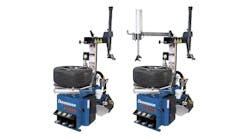Why did the United States International Trade Commission (ITC) determine, in its own words, "there is a reasonable indication that a U.S. industry is materially injured or threatened with material injury by reason of imports of certain passenger vehicle and light truck tires from China that are allegedly subsidized and sold in the United States at less than fair value"?
Here is the fact sheet from which the ITC based its decision ("ITC says Chinese imports may be harmful").
1. Number of domestic tire producers in 2013: Nine.
2. Location of producers' plants: Alabama, Arkansas, Georgia, Illinois, Indiana, Kansas, Mississippi, New York, North Carolina, Ohio, Oklahoma, Pennsylvania, South Carolina and Virginia.
3. Employment of production and related workers in 2013: 29,000.
4. Apparent U.S. consumption in 2013: $22.3 billion.
5. Ratio of the value of total U.S. imports to total U.S. consumption in 2013: 47%.
6. Worth of consumer tire imports from China in 2013: $ 2.3 billion.
7. Worth of consumer tire imports from other countries in 2013: $ 8.2 billion.
8. Leading sources of consumer tires, in terms of value, in 2013: China, Canada, Korea and Japan.
And here are the facts as the United Steelworkers International union sees them. The USW filed the initial petitions seeking relief from "unfairly traded Chinese tires."
"The ITC’s preliminary determination is a vital step on the path to restoring fair trade in passenger vehicle and light truck tires," says USW International President Leo Gerard.
"President Obama in 2009 responded to a case filed by the USW and provided relief under a different section of our trade laws to stop a flood of these tires from China. That action helped stabilize the industry for the three years that relief was in place. But as soon as the safeguard ended, China once again targeted the U.S. market, attacking the jobs of U.S. workers. Massive dumping and subsidization of tires began to capture market share here in the United States.”
USW International Secretary-Treasurer Stan Johnson says that “while relief was in place, billions of dollars in investments were made by firms producing tires in the United States in new plant and equipment. But China’s targeting of our industry has injured our members. They work hard and play by the rules and all they want is a fair chance to compete. They deserve to have our nation’s trade laws aggressively and faithfully enforced.”
Tom Conway, USW vice president, says China’s leaders aren’t interested in following the rules of international trade. "They’re only interested in a win-at-any-cost, play-by-any-rules trade policy. The USW plays by the rules, but when other countries thumb their noses at fair play and cheat, our primary recourse is to pursue lengthy, expensive and sometimes uncertain processes to restore fairness and save our jobs. In essence, the only way we win is by losing: We have to lose jobs before we can act, and by the time relief is provided, if it even is, we’re faced with digging out of a hole.”
Gerard says the USW has brought or participated in more trade cases than any single entity. "That is not a badge of honor. It’s a sign that our trade laws are in need of dramatic reform.
“We’re waging a fight against unfair trade based on rules that are more than a quarter century old, while our competitors target industry after industry. Things must change. Workers, and America, can’t afford much more of this.”
For a different viewpoint, read "If tire tariffs are implemented, tire prices will rise again."


